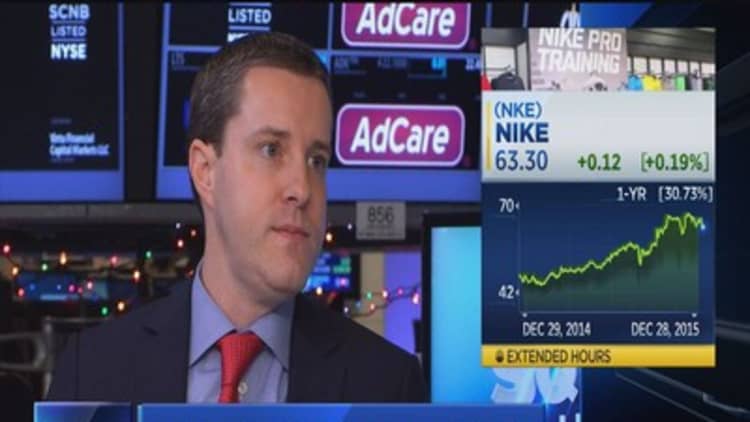
One of the fastest-growing categories in retail is positioned to become an even more formidable competitor.
Off-price stores, whose sales growth has outpaced others in the industry over the past several years, have long struggled to overcome the very thing that's made them popular with consumers: The art of the treasure hunt.
In the past, when traditional retailers or brands have tried to offload inventory to these stores, which include T.J. Maxx and others, the stores are handed a long list of codes that correspond to each style up for sale.
Because these lists are so tough to decipher, off-price buyers are often stuck searching for images of each of these products, or placing bulk orders without knowing exactly what they're getting.
A new software solution hopes to change that. Created by 2-year-old technology company Inturn, the program automatically calls up images for each item being sold, thereby speeding up the negotiation process. Items can also be filtered by brand or category — for example, dresses or T-shirts — making it easier for stores to buy products as a collection.
Though it sounds like a back-office solution, the end result is one that benefits consumers. By streamlining the buying process and making it easier for off-pricers to see what's on the market, they can provide discount shoppers with a more cohesive and in-season assortment.
In other words, instead of seeing a hodgepodge of T-shirts and skirts that may not go together, Inturn would make it easier for off-price stores to pair like items, and send shoppers out the door with a complete outfit.
The system also makes it easier for overseas brands to participate in negotiations, which could give U.S. consumers access to new labels.
"There's still people buying bulk orders not really understanding what it is they're buying until it shows up," said Ronen Lazar, CEO of Inturn. "This provides full visibility."
Since the financial crisis, off-price retailers have been gaining share at the expense of traditional department stores.
According to recent analysis by Morgan Stanley, the compound annual growth rate of sales from a group of six off-price retailers including Ross and TJX increased 6.8 percent between 2009 and 2014. By comparison, sales at Macy's, Kohl's and Nordstrom increased 4.1 percent over the same time frame. That number falls to 3.5 percent growth when stripping out Nordstrom's discount Rack division.
Meanwhile, has lost more than $12 billion in revenues over that time frame, recording sales of $31.2 billion last year. And J.C. Penney is still trying to claw back the sales it lost during a failed turnaround strategy.
Despite the robust growth of off-prices, analysts predict the category still has plenty of levers to pull. These include popularity among millennial shoppers, the potential for a larger store footprint and the opportunity to expand their stake in the home goods category.
Streamlining relationships with vendors would be just another tool in off-pricers' belts. Separate analysis issued earlier this month by Citi contended that vendors, like consumers, are starting to see the benefits of these stores.
"When a vendor sells to a department store it is not the end of the transaction," Citi analyst Paul Lejuez told investors. "If the department store has trouble selling the goods, they will come back to the vendor asking for allowances/markdown money to help compensate them for having to sell the product at a discount."
In contrast, there are no allowances or markdown money given to off-price retailers. "Once the sale is made, the vendor has their money and the transaction is complete," Lejuez said.

As for Inturn's role in the negotiation process, Lazar said his system benefits both buyers and sellers, which could be traditional department stores. He said one of the biggest advantages is that it dramatically cuts down the time it takes to have these conversations, in some cases reducing them from 10 days to 20 minutes.
That means merchandise can be purchased and moved into stores faster, giving the off-price retailer more in-season product. The seller also benefits by getting paid quicker.
Inturn has raised $3.85 million in funding, and counts the investment fund of Silas Chou, a former investor in Michael Kors, and Beanstalk Ventures, a fund started by Bluefly founder Ken Seiff, as backers. The firm is not able to disclose its client list due to contract restrictions, but said it works with "a lot of the big global apparel brands."
Ken Perkins, president of Retail Metrics, said a system like Inturn has the potential to put even more pressure on traditional department stores by allowing off-price competitors to streamline what they're buying.
"Like they don't have enough competitive pressures already," he said. "They just continue to mount from so many different directions."





